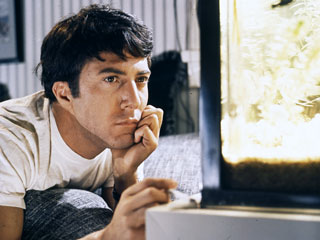 I meant to write this post on Thursday or Friday. Hopefully, this topic hasn't lost its relevance yet.
I meant to write this post on Thursday or Friday. Hopefully, this topic hasn't lost its relevance yet. As a blog that devotes exclusively to the moving image, it is only a rare, yet deserving occasion that I would devote an entire post to a book. This is one of those occasions.
On Thursday, J.D. Salinger, author of "Catcher in the Rye," died of natural causes. He was 91. Salinger has become quite legendary for his extreme secrecy. However, his true claim to fame is his writing of the American classic "Catcher in the Rye."
"Catcher in the Rye" seems to have become a mandatory read in this country. Every high school student is given a copy to read at some point in their lives. I am proud to say its one of the only required readings I've ever been given in my life that didn't feel like a chore. For those who haven't read it yet, "Catcher" tells the story of Holden Caufield, a teen who has just been kicked out of boarding school and now spends a few days aimlessly wandering through New York City before having to face the reality of telling his parents.
Holden Caufield hasn't necessarily been an idol to me but rather just someone I look to to understand my own life. Over 60 years on, he truly resonates as one of pop culture's greatest anti-heroes. He is someone who acts so mature yet ironically is extremely immature. He also is something of a representation of anti-establishment. For all these things, Salinger's creation has never left our thoughts.
Surprisingly enough, there has still never been a film version of "Catcher in the Rye." This is mainly because Salinger strictly guarded his story's rights. It wasn't out of pure stubbornness, but rather because Salinger never wanted us to see Holden. It was up to our imaginations. After Salinger died, there were random whispers on the web of a future film adaptation.
Not only would it be wrong to ever adapt "Catcher in the Rye," it would also be extremely unnecessary. It would be unnecessary because in a way, Holden's story has already been put on the screen hundreds of times, with amazing results.
One of the finest examples is "The Graduate." Ben Braddock mirrors Caufield in his aimless wandering. Both of their unsure journeys from kid to adults seem like sort of dangerous purgatories. And both characters, despite lacking ambitions, are so hard not to root for.

Perhaps a film much more directly influenced by Salinger is "Rushmore," which is the story of a teenager kicked out of private school for his failing grades. Like Holden Caufield, Max Fisher acts much more mature than he actually is. Perhaps the best way that Anderson imitates Salinger is the way in which we view his character. We don't necessarily root for his immaturity but rather for his journey to maturity and the harsh way he is pushed around by society.

While most of my influences remain in the film world, there are only a few others from different mediums that I can say have truly influenced my life. Of those, all I can think of are Bob Dylan, Lorne Michaels and J.D. Salinger. Not only has he touched my own life, but he's also shaped the way that films tell stories. We never need to see Holden Caufield on film because in truth, there is a Holden Caufield in all of us.

No comments:
Post a Comment